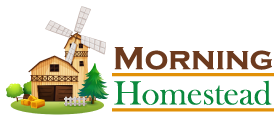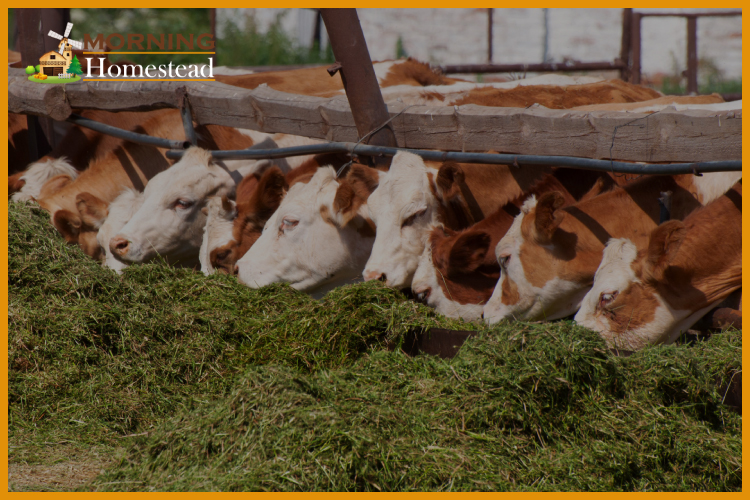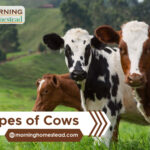Last Updated on June 9, 2023 by Georgie Smith
The beef industry can be cut-throat when it comes to having the right cows for sale at the right price. It is true that cattle feed is part art and part science with a little luck tossed in. New and seasoned cattle farmers tend to stick with their own beliefs concerning the feed for their cows.
The ingredients in the feed are the number one concern that farmers face. Feed for animals is similar to humans when referring to how many times one product can be “new and improved.” The cattle industry is responsible for ensuring beef cattle farmers uphold their duty of supplying consumers with healthy and safe products.
All it takes is one dry, long summer followed up with a late fall break to cause chaos throughout the cattle industry. When this happens, panic sets in with the farmer that does not have enough in their preserved supply of food. Also, not having room to graze due to limited pasture space is also an issue.
See Also:
- Best Pig Feed For Taste And Weight Gain: Guide and Review (2023)
- What To Feed Baby Rabbits 2-3 Weeks Old? [Orphaned Baby Bunnies]
- What To Feed Baby Chickens After Hatching? What Do Baby Chickens Eat?
This article on the best feed for beef cattle is to outline basic considerations you need to understand about the beef industry and food.
The Beef Industry in the United States
The leading producer of beef worldwide is the United States. Each year there are anywhere between 24 and 27 billion pounds of beef products produced in America. That number today may be lower as there has been a slow decrease in the consumption of beef over the past couple of decades.
At one time there were around 70 pounds per individual. However, a slow decline over the years has caused it to drop to less than 55 pounds per capita currently. Even though there has been a decrease in domestic need for beef, the foreign demand is still a booming business in the United States.
In other words, the exporting of beef to countries around the globe is as active as ever. In America, beef cattle feed rations are at times a reason trade markets are not so profitable.
The Current Leaders in Cattle Feed
Hay Filled with Nutrition
It is no shock that hay is on the top of the list as a vital nutrient for cows. The reason is that hay supplies primarily every essential nutrient a cow needs. However, hay can be tricky too because farmers must bush-hog it at the right time when nutrient richness is in full swing. If the farmer waits too long, the hay becomes too dry, and the entire crops suffer.
For the hay to be an efficient food source for cows, it must also be cured carefully and stored in a haven to prevent it from rotting and weather damage. There are many types of hay that supply a load of great nutrition.
Alfalfa Hay is a good example. This type hay has more phosphorus and calcium than grass hay. However, grass hay is higher in various proteins. For this reason, many farmers mix grass hay with Alfafa together rather than solely using alfalfa.
While alfalfa hay comes highly recommended for dairy cows, it is not necessarily the best match for beef cattle. The reason why is because Alfalfa is a leader for causing cattle to bloat. Legume hay is also a popular option for nutrition for cows because of its high amounts of protein.
Grain Supplements:
If you want your cattle to grow quick, grain is what you need. Grains are the “go-to” food to help add fat to your herd. In fact, many cattle farmers choose to feed grains to their cows to help them gain weight and fat. They do this when getting the cow’s ready for the market to sell or for slaughtering. It also helps reduce the cost associated with boosting cattle when getting them ready for market sooner.
Supplements from grain are an excellent solution for cattle and feeding season when there is a lack of high-quality hay and pastures to graze. Here is where it tends to get tricky. While you need to give your cattle supplements, it is vital not to allow them to become dependent on eating them. By doing so, it will discourage the herd from other nutritionally assorted foraging and pastures.
Concentrates that are Important:
The following is a list of concentrates that are great additions to your cow’s nutritional plan:
- Liquid Supplements
- Wheat Bran
- Grain Sorghum
- Barley
- Wheat
- Corn
- Oats
These each is low in fiber yet high in nutritional value. They also have plenty of carbs and a more expensive price tag than forages. Concentrates can be perfect as a supplement. However, you must carefully contemplate the cow’s weight and needs when you choose this method. The reason why is to prevent issues with digestion and overeating.
Pasture and Forage Feeding
Pasture and forage feeding will provide your cattle with all the essential nutrients they need. That is unless there is a depletion of soil or the prosperous grass growth season comes too early. The most cost-effective option is pasture nutrients for cattle feed. Beef cattle feed rations
If you want your cattle to rely on pasture feed and forage, you need to perform a soil fertility test. Test such as these check for dampness as well as dryness of the hay. It takes maintaining a good environment to guarantee plants and feed remain at their best nutritional density.
*Helpful Tip* Monitoring the maturity and overall condition of the soil is one secure way to know your livestock is eating good hay and healthy forage.
Best Feed For Beef Cattle on Amazon:
Manna Pro Goat Mineral | Made with Vitamins
Do not let the title fool you into thinking this feed is only for goats. Cows will welcome in it their feeder any day and rightfully so due to its superb taste. This product comes in a 20-pound bag and is perfect for your dairy cows.
The best dairy goat feed is soy-free, corn-free, Non-GMO and organic. Any farmer would have a hard time saying no to providing their cows with the nutritional goodness of this item. All Natural Fertrell Nutri-Balancer is just as suitable for dairy cows as it is for goats.
Due to having copper as an ingredient, it is best that you not feed it to sheep. The feed has a healthy variety of grains, protein, and seed sources. Combined with Fertrell, this Best Dairy product provides your cows with the supplemental ration they need.
You can buy this product for your cows and join the other millions of farmers who rave about just how much their cattle improve. Understanding your cattle needs supplements puts you one step ahead. Having this guide to help you with knowing the best products to buy, puts you in the driver’s seat. Shop Smart!
Buy from Amazon
Land O’Lakes Purina Feed
Not all cow feed is the same, and Purina is glad. This Land O’Lakes Purina Feed is one reason cow farmers are happy that they have products continuously coming in as leaders. This item is a 14-protein, all-natural feed for calves and growing cows that survive on grasses and forages.
Cow farmers buy this feed for many reasons. One is because of the level of healthy protein sources from the all-vegetable ingredient formula. When you need to have a feed on hand for your cows when forage and grass diets are unavailable, this is your winner.
The balanced combination of the following is what makes this feed a leader in feed for cattle, these are:
- Added Salt
- Trace Minerals
- Calcium
- Phosphorus
- Controlled Creep
- Vitamin A
The feed encourages lean, healthy growth for calves that are steadily growing into bulls and heifers. The healthy components aid in building muscle, and skeletal properties, and not fat. It comes in a 50-pound pellet bag delivered directly to your front door. Many farmers buy this product here as they can rest assured they are getting the best products at the best prices.
Buy from Amazon
Manna Pro Calf-Manna Ultimate Multi-Species Performance for Animals
Calf-manna Ultimate Multi-Species Performance comes in a ten-pound bag, contains a variety of flavor ingredients and is incredibly palatable. The Manna Pro contains high-quality amino acids, proteins and yeast cultures.
You can either feed it alone or as a topped dressing with other feed and is an excellent pre-starter for calves. It has a one-year shelf life, is easy on cows’ stomachs has a money-back guarantee. This cow feed product is the perfect addition to your cow’s meal plan.
Buy from Amazon
FERA Probiotics Animal Nutrition Precon Complete Non-Medicated
This FERA Animal Nutrition Precon feed is ideal for calves that are new to eating and not still feeding off its mother. The tastiness is just one thing that attracts the calves. The other is how simple it is to eat. Young calves chewing feed for the first time tend to avoid it if it is hard to eat. This product is everything but hard to digest.
The stress is a severe factor for when the mother is weaning her calves so they can begin eating dry feed. Purina kept this in mind when they decided to create a feed just for weaning purposes. Each pellet contains plenty of minerals and vitamins that when blended become a perfect balance of nutrients.
Feeds such as this prize from Purina encourage weight gain and health. Its purpose of it is for restoring trace mineral levels where they need to be to support the immune system. One particular achievement is supporting the regime of cattle that are nutritionally stressed and challenged.
When you place your order here for this 50-pound bag, you can rest assured that you are ordering from the number one source, Amazon. With all orders, Amazon protects both buyers and sellers to ensure a smooth operation.
Buy from Amazon
ADM Animal Nutrition
Nothing with the name “sweet Unique” can be wrong for either humans or animals. This feed from ADM Animal Nutrition comes in a 50-pound pellet bag delivered to your home. It is made strictly from high-quality ingredients as any fan of ADM would expect.
Manufactured by a world-class animal science team, ADM ensures your cattle will get all they need to be healthy. This item, Animal Nutrition adds taste as well as improves your cow’s overall system. Place your order for this product here and be sure to read the instructions before feeding your calves.
There is the five best-selling feeds for beef cattle products on Amazon.
Buy from Amazon
Choosing a Feeding Plan for Your Cattle Herd
What you decide to feed your beef cattle has a direct effect on the quality of the meat. It also has an impact on the marbling of fat as well as the overall prices you get at the market. The results you get when selling or slaughtering your cattle all depend on the feed you choose.
A thorough plan for feeding beef cows should always take into consideration the availability and cost of the feed and the herd’s nutritional demands. Depending on the cattle’s health, some farmers must choose feed based on other aspects of their diet.
However, providing a high-quality feed helps improve your profits and yield at the market.
Cattle Feed Plans: What Works For Beef Cattle?
All cattle are herbivores or simply put, plant eaters. Cows are also ruminants, which means they chew the “cud” that they regurgitate from their four stomach pouches. Cows have no problems extracting the nutrition they get from forage items. Ruminants have unique stomach chambers that are full of microorganisms that help the digestive tract of cattle.
These microorganisms are incredibly effective in breaking down each component of hay, grass, and other plant life. Beef cattle need specific nutrients to thrive and grow. These are:
Protein:
Cows are proficient at extracting protein from veggie plants. While various grasses and hay contain protein, most beef cows get the majority of protein from legumes. Soybeans are the number one source followed by Linseed and cottonseed meal. Mineral blocks play a large role in the health of cattle, especially young calves.
Minerals:
The mineral amounts in the hay will vary due to the content found in soils where the hay grows. For this reason, extra care and attention to pastures are vital. Although cows get plenty of vitamins and minerals from grazing, most farmers place mineral blocks around for the additional salts and minerals cows need.
Vitamins:
Beef cattle need a heap of vitamins. Vitamins A, E, and D are the most important as well as Vitamin B, and K. Stressed cows, such as cows transported on long trips and recently weaned calves often need a boost of vitamin B.
FAQs:
Q: How often should I feed my cow?
A: Most cattle owners feed their cows twice per day, some cattle get three feedings.
Q: What is the estimated shelf life of animal or livestock feed?
A: Livestock feed can keep its value for up to six months as long as you store it in a dry, cool environment.
Conclusion
Beef cattle get plenty of their vitamins through pasture grazing. However, some cows need additional nutrients to thrive and grow. Most feed plans include various ratios of grain, hay, and a choice mineral or two.
Do you have cattle and want to add to this article about the best feed for beef cattle? Alternatively, do you have a question? Please leave us feedback in the comment section below. Also, while you are here, come you please “like and share” our page? We thank you kindly for your time.





